The fitness and bodybuilding supplement industry has undergone a remarkable transformation over the years, driven by groundbreaking innovations that have not only shaped trends but fundamentally changed how we approach supplementation for health and performance.
Over time, the innovations born in the sports supplement space, particularly the bodybuilding space, have profoundly shaped the broader supplement industry, inspiring trends in everything from protein powders, meal replacements, nootropics, functional foods to energy boosters and beauty supplements.
At the heart of this evolution are pioneering brands and products that came up with entirely new products, introduced new product categories, new ingredients or influenced formulation trends that still resonate today.
In this multi-part article, we’ll delve into the iconic supplements that redefined the industry, exploring their revolutionary impacts and the trends they ignited.
As someone who has been following supplement formulation trends for 27 years and counting, this is my personal account of the products that made history. If I’ve missed anything or you have your own insights, feel free to reach out! You can follow me for more supplement history content on Instagram @retrosupplements.
1. Rheo Blair’s Instant Protein Supplement: The Original Game-Changer in Sports Nutrition
When it comes to early bodybuilding supplements, Weider’s Crash Weight Gain holds a special place in history as one of the first products specifically designed to help athletes gain mass quickly. Launched in the 1950s by Joe Weider (who needs no introduction), Crash Weight Gain was marketed as the ultimate solution for “hard gainers” struggling to put on muscle.
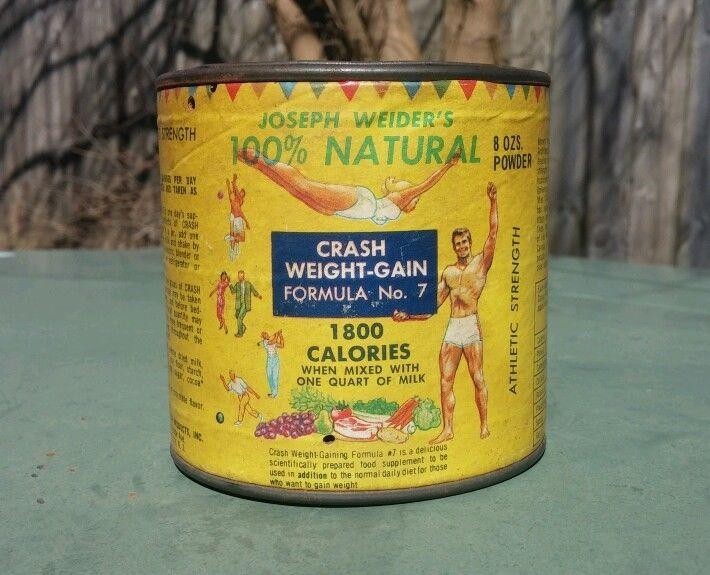
What Was Crash Weight Gain?
Crash Weight Gain was essentially a high-calorie mass gainer, a powder that could be mixed with milk to create a calorie-dense shake. I don’t have the nutritional content but it likely consisted of carbohydrates and proteins (probably milk or soy-based). The formulas evolved over the years, but the concept remained the same: to deliver a concentrated source of calories and nutrients to fuel muscle growth/ weight gain.
Marketing Genius
Joe Weider wasn’t just a supplement pioneer; he was a marketing visionary who understood the power of aspiration and sold dreams. Crash Weight Gain, became iconic largely due to the heavy advertising in his own fitness magazines, with ads often showcasing dramatic before-and-after transformations, where bodybuilders claimed to have packed on incredible amounts of muscle thanks to the product.
Weider’s ads painting a vivid picture of what life could be like with a bigger, stronger physique. They featured men who gained the confidence to stand up to bullies, or who suddenly found themselves surrounded by beautiful women. The messaging was clear: Crash Weight Gain wasn’t just about building muscle—it was about transforming your life.
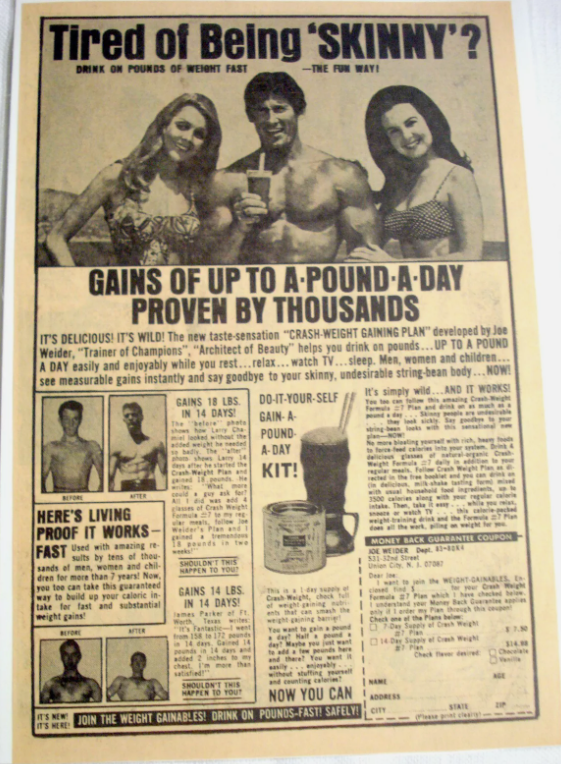
By tapping into the emotional and social aspirations of his audience, Weider didn’t just market a product; he cultivated a movement that fueled the golden era of bodybuilding.
Unfortunately, the Weider brand’s prominence has faded in the U.S. Weider Germany remains a significant player in the European supplement market. Weider bodybuilding products are also available in South Africa but has significantly diminished product range, reflecting a missed opportunity to tap into the incredible legacy of the Weider name.

A later version of Crash Weight gain (80s) featuring Dennis Tinerino
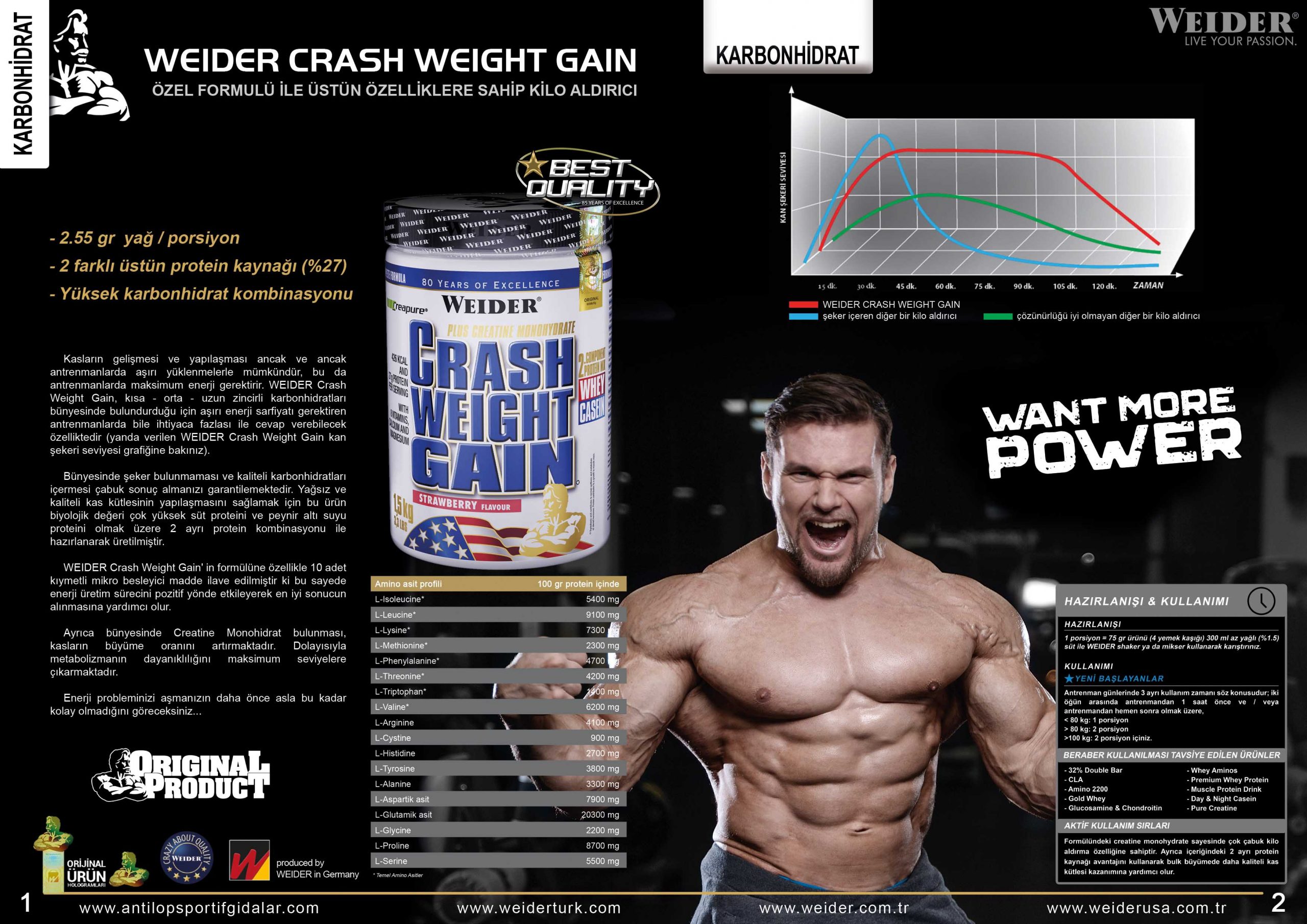
Weider Crash Weight Gain in the 2020s. Weider is available in Europe and South Africa.
3. Beverly International: The Gold Standard of Old-School Bodybuilding
Established in 1967, Beverly International was one of the original pioneers in the bodybuilding supplement industry.
Over 57 years later, Beverly remains a trusted and enduring name. While many brands have come and gone, Beverly’s longevity and continued relevance speak volumes about its legacy.
Meticulous Formulations and sticking to what works
From its early days, Beverly set the bar high with carefully crafted products like Ultra 40 Liver Tablets, Mass Maker Ultra, and the legendary Ultimate Muscle Protein (UMP).
These supplements were designed for serious athletes who valued performance and results over marketing gimmicks. Remarkably, products like UMP (Ultimate Muscle Protein) and Mass Maker Ultra are still available today, showcasing their enduring effectiveness and popularity.
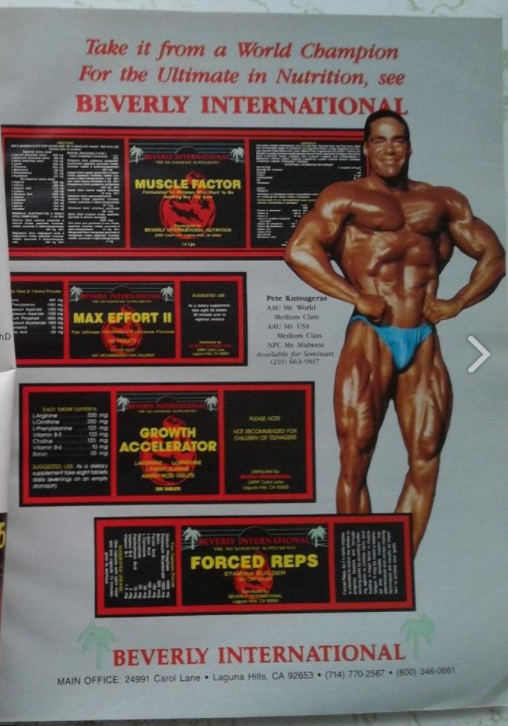
Beverly International has also thrived in an industry often driven by fleeting trends and fads. By staying true to its roots and maintaining a focus on quality and integrity, the brand has cultivated a reputation as the “gold standard” of old-school bodybuilding and is a shining example of longevity and integrity in the ever-evolving fitness world.
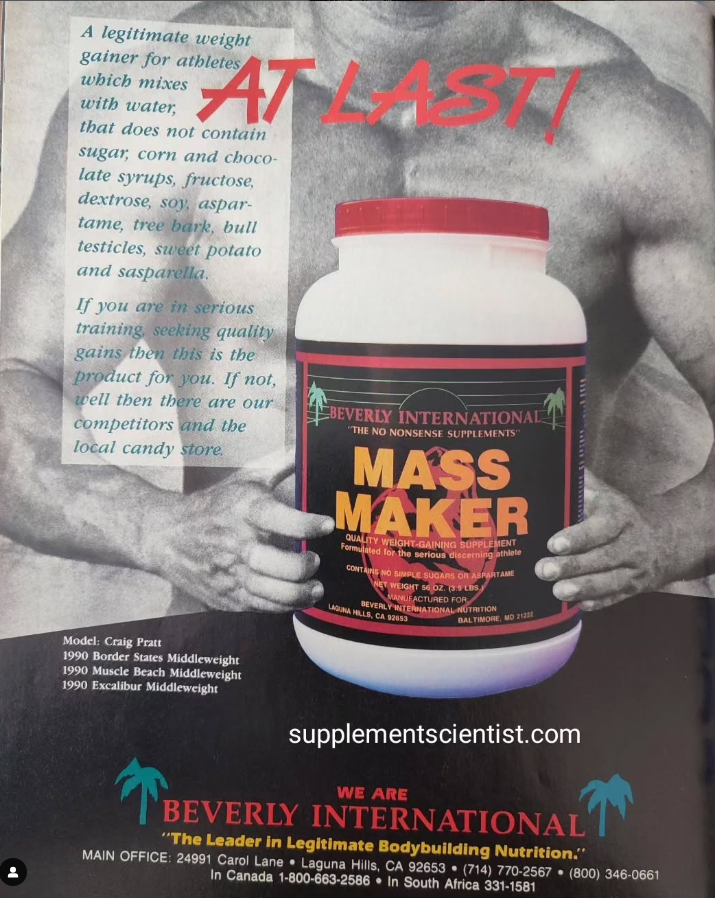
Beverly International in the early 90s.
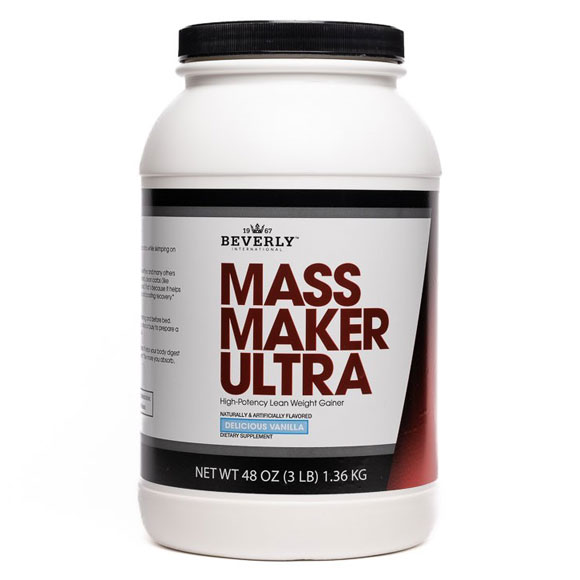
Beverly International Mass Maker Ultra today
4. Universal Nutrition Animal Pak: The Hardcore Multivitamin That Defined a Generation
Animal Pak, from Universal Nutrition launched in the 1980s, became a symbol of commitment and grit within the bodybuilding community.
However, its popularity exploded in the mid-2000s, coinciding with the resurgence of hardcore bodybuilding culture and the rise of social media.
This multivitamin wasn’t just about supplementation—it was a statement. Packaged in single-serving packets of pills, Animal Pak embodied the “no excuses” ethos that resonated with serious lifters.
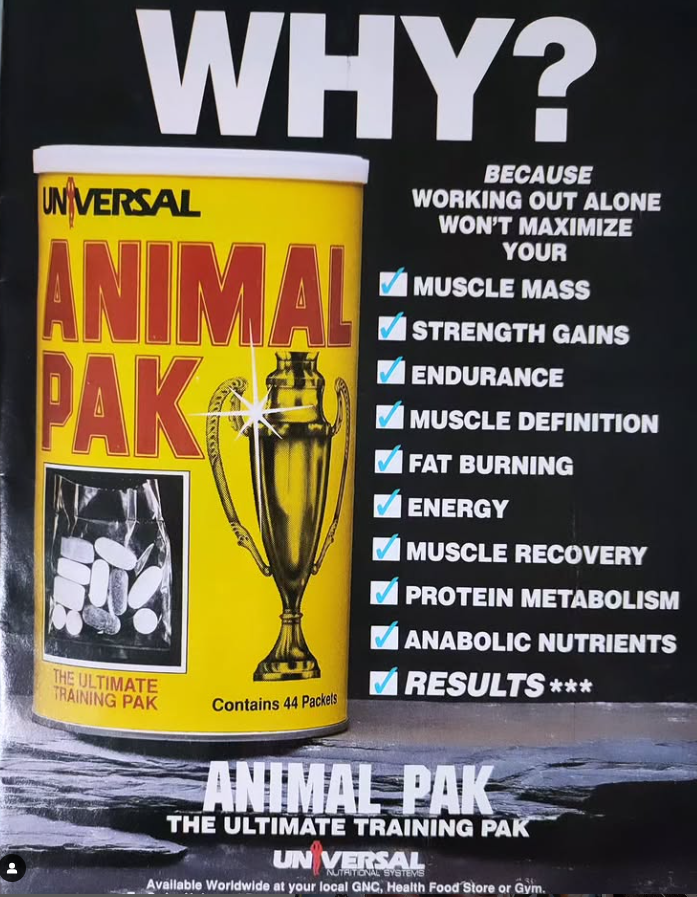
Animal Pak in the late 80s
Why Animal Pak Stood Out
- Unmatched Formulation:
Animal Pak wasn’t an average multivitamin. Each packet contained a robust blend of vitamins, minerals, amino acids, digestive enzymes, antioxidants, and performance enhancers like arginine. It was marketed as a complete nutrient arsenal for athletes who demanded peak performance and recovery.
- Single-Serving Packets:
The pre-portioned packets made it easy for athletes to carry their supplements to the gym or on the go, a novel concept at the time. Animal Pak’s success led other brands to develop their own “hardcore” multivitamins. It also influenced the broader trend of single-serving packets in the supplement world.
- Hardcore Branding and cult-like following:
Universal Nutrition leaned into the rugged, no-nonsense image of the Animal line. With bold black-and-yellow packaging and gritty advertising featuring hardcore bodybuilders, Animal Pak stood out in a market dominated by sleek, corporate-looking multivitamins. Universal Nutrition also strategically partnered with some of the most respected names in bodybuilding, including Frank McGrath (known for his resilience and larger-than-life persona), Evan Centopani (a disciplined, intelligent bodybuilder who embodied the brand’s ethos) and Vince Galanti (a stalwart ambassador who represented unwavering dedication and authenticity).
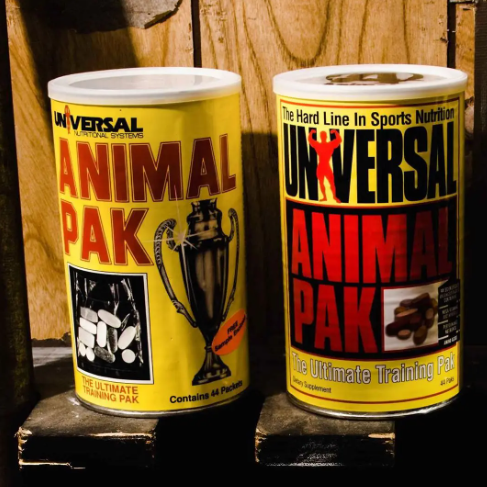
Packaging comparison: Animal pack in the late 80s (left) and 90s (right)
5. Hot Stuff Rx: A 1980s Supplement Revolution
In the mid-1980s, Hot Stuff Rx, created by Tom Ciola, burst onto the sports nutrition scene, forever changing how supplements were marketed and consumed. It wasn’t just a product; it was a cultural phenomenon that embodied the wild experimentation and unapologetic boldness of the era.
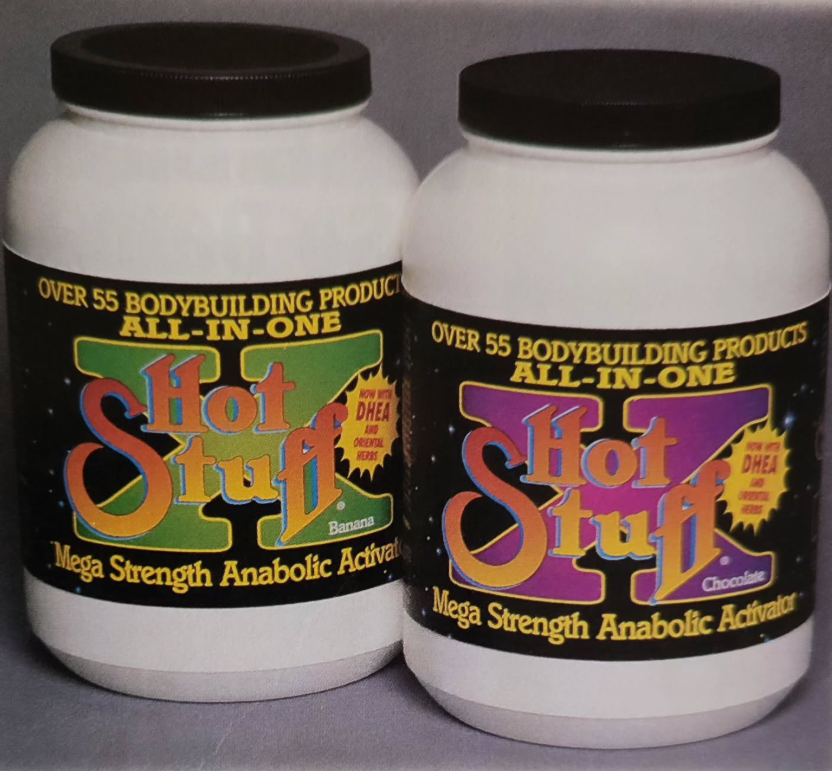
Mid to late 90s Hot Stuff packaging
The Formulation
Hot Stuff Rx was marketed as an all-in-one performance enhancer, boasting a “proprietary blend” that included amino acids, herbs, glandular extracts, vitamins, and minerals. The formula included popular ingredients of the day: amino acids, glandulars, Smilax, Gamma Oryzanol, Ginseng, Ferulic acid, etc., boasting more than 50 unique active ingredients in the formulation.
While the quantities of each ingredient list was a mystery, the product promised explosive muscle growth, fat loss, and unmatched energy levels.
Athletes and bodybuilders were captivated by the idea of a “magic powder” that seemed ahead of its time, even if the exact science behind its effects was elusive.
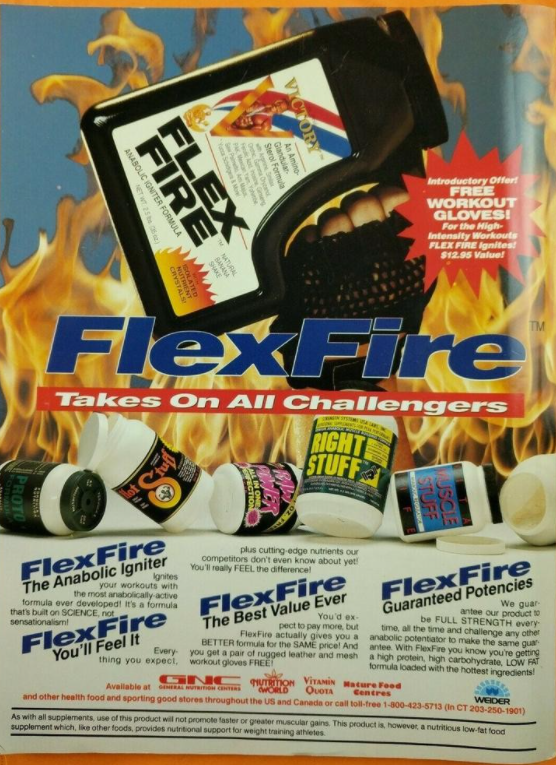
Victory FLEX FIRE, Weider’s answer to Hot Stuff and other similar products (Muscle Stuff, Right Stuff, etc.).
Innovative Marketing
Tom Ciola didn’t just sell a product; he sold a dream of limitless potential. Multi-page Hot Stuff ads were ubiquitous in bodybuilding magazines, often featuring IFBB Pro Steve Brisbois who was related to Tom Ciola.
The packaging itself—vibrant and audacious—stood out on shelves, becoming instantly recognizable.
Ciola’s marketing genius extended to creating a sense of exclusivity and mystique, encouraging athletes to believe they were part of an elite group tapping into next-level science.
The Controversy
Hot Stuff Rx wasn’t without its critics. Some questioned the efficacy of the blend, while others speculated that early formulations might have contained banned substances that contributed to its potent effects. While these claims were never substantiated, they only heightened the product’s legendary status among users.
Legacy
Hot Stuff Rx paved the way for the “kitchen sink” approach to supplements, where products included a wide array of ingredients to maximise appeal. It was one of the first to effectively blend science, mystique, and aggressive marketing into a single package, setting the stage for future products to follow suit.
Today, Hot Stuff is remembered not only as a supplement but as a symbol of an era when bodybuilding was as much about experimentation and daring as it was about discipline. For many, it remains an unforgettable part of supplement history, cementing Tom Ciola’s place as a pioneer in the industry.
6. Ultimate Orange: The Original Pre-Workout Legend
In the world of supplements, Ultimate Orange holds a legendary status as the product that essentially created the modern pre-workout category. Ultimate Orange was created and launched in the 1980s by Dan Duchaine, a controversial but undeniably innovative figure in the fitness world. Ultimate Orange combined cutting-edge ingredients with a cult-like following to become a staple in gyms everywhere for more than a decade. It is one of the first preworkouts that I have tried in the late 90s.
What Made Ultimate Orange Revolutionary?
Ultimate Orange wasn’t just a protein powder or amino acid supplement—it was an all-in-one performance enhancer designed to give users a surge of energy, focus, and stamina for intense workouts. Its key ingredients included:
- Ephedra: A powerful stimulant that boosted energy, focus, and fat-burning, though later banned in the U.S. due to safety concerns.
- Caffeine: A workout classic, enhancing alertness and endurance.
- Carbohydrates: A quick fuel source to keep energy levels high during extended training sessions.
This potent combination delivered a workout experience unlike anything else available at the time, making it a favorite among bodybuilders, athletes, and fitness enthusiasts.
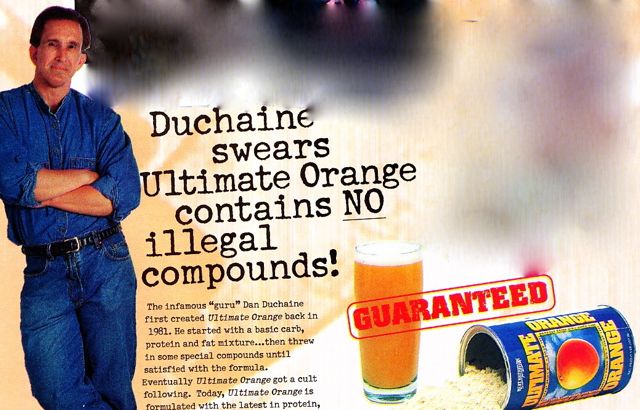
The Cult Following and Controversy
Ultimate Orange wasn’t just a product; it became a phenomenon, with users swearing by its ability to push them past plateaus. However, its use of ephedra eventually brought the product under scrutiny, as concerns over potential side effects, including heart issues, led to regulatory changes. Despite this, the product’s influence is undeniable—it paved the way for the pre-workout category, now a cornerstone of the supplement industry.
The Ultimate Orange Legacy
Though it’s no longer available in its original form, Ultimate Orange left an indelible mark on the supplement industry. It introduced the idea that supplements could do more than support nutrition—they could actively enhance performance and motivation. Today’s pre-workouts, with their blends of caffeine, beta-alanine, and other performance-boosting ingredients, owe much of their existence to the trail blazed by Ultimate Orangel, which I’d consider the grand-daddy of all preworkouts.
Stay tuned for the next part, where we’ll continue exploring more game-changing supplements that defined the eras to follow. If you have thoughts, memories, or favorites, connect with me on Instagram @retrosupplements—I’d love to hear from you!
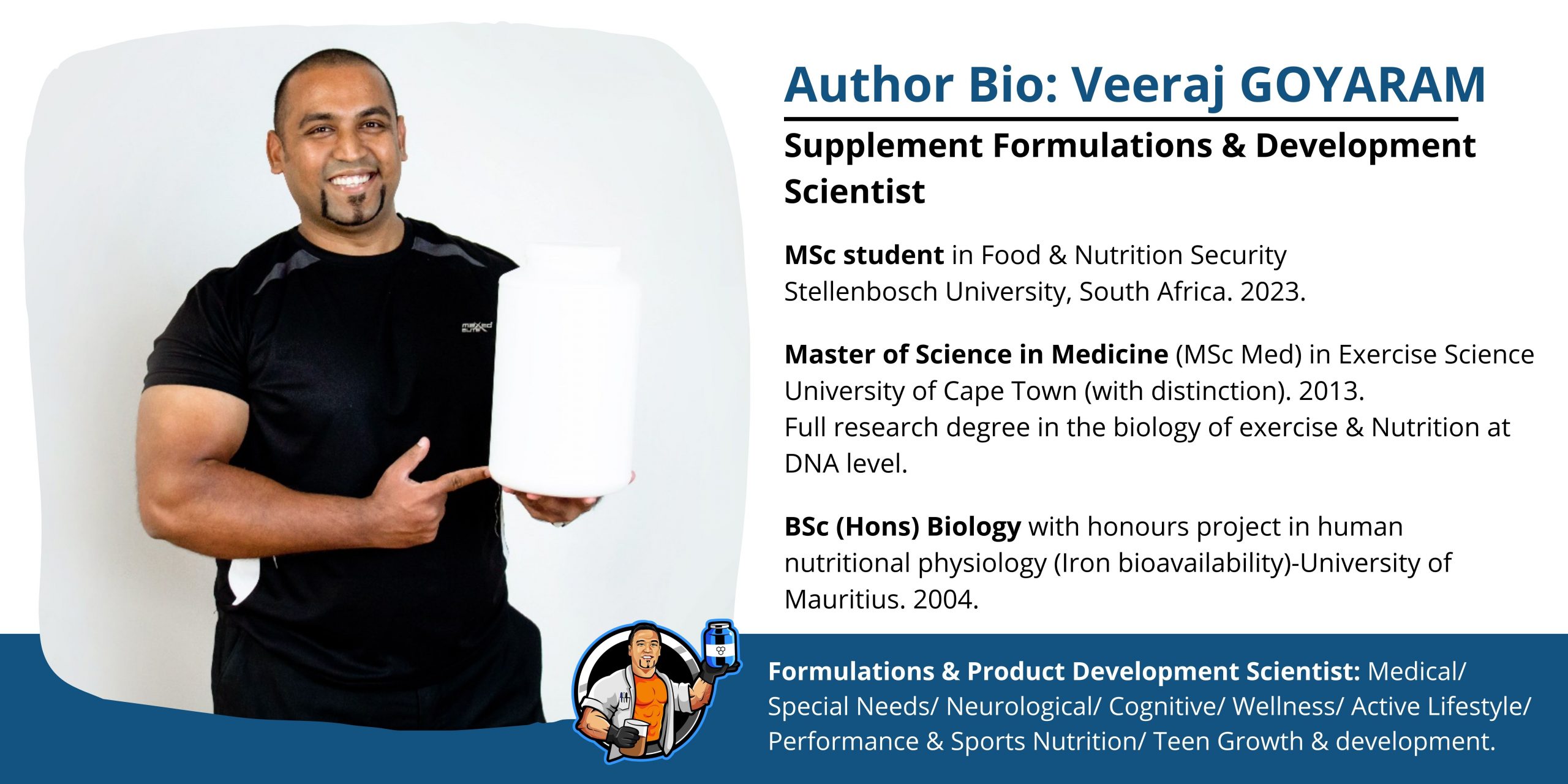
To view my Professional Profile on LinkedIn: please click here
To see my latest product creations: www.bioteenhealth.com
To view my Scientific Publications on PubMed: please click here
To get in touch, please write to: info@supplementscientist.com
Follow supplementscientist.com on Facebook: please click here
Disclaimers
Medical: The information presented on this website is intended for adults 18 or over. Its aim is purely educational and does not constitute medical advice. Please consult a medical or health professional before you begin any program related to exercise, nutrition, or supplementation especially if you have a medical condition. If you consume any product mentioned on our site, you do so on your own free will, and you knowingly and voluntarily accept the risks.
Other: The views expressed in this blog article are solely mine and do not represent the opinions or positions of any company or institution with which I am associated. Any information or opinions provided are based on my personal experiences, research, and understanding. I strive to ensure accuracy and reliability of the information provided. © 2024. Supplementscientist.com

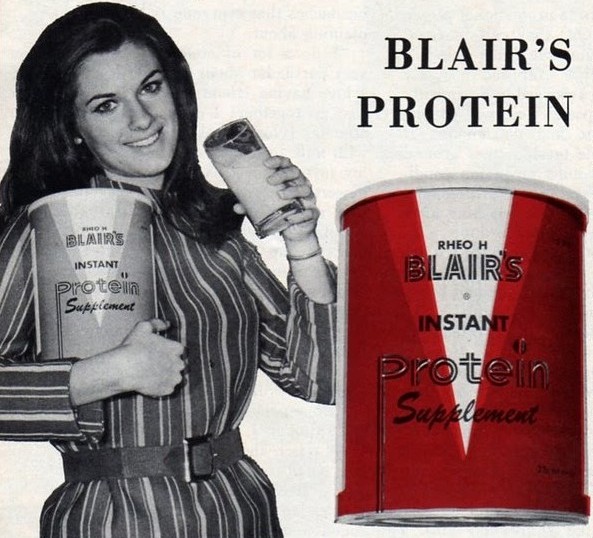
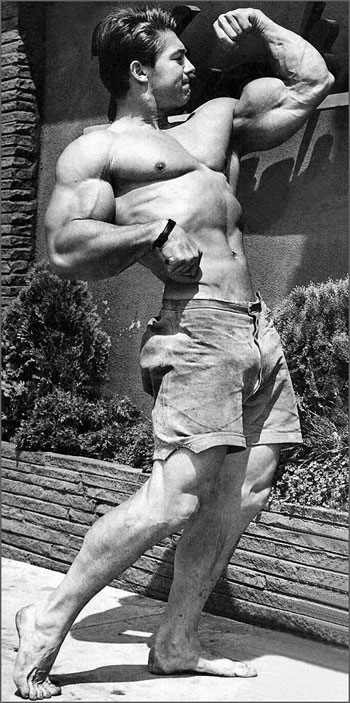

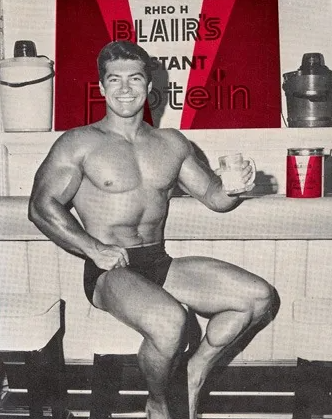

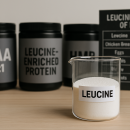




Leave a Reply